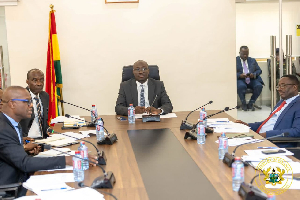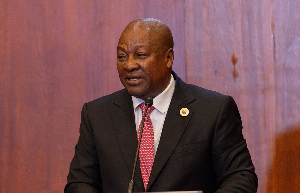General News of Friday, 28 August 2020
Source: theheraldghana.com
Agyapa Royalties board members to enjoy employment till they die – Dr. Steve Manteaw
The Alliance of Civil Society Organisation on Extractives, Anti-corruption and good governance has revealed that the appointment of the Board of Directors for Agyapa Mineral Royalties is a permanent one.
The group made up of some fifteen Civil Society Organizations indicated that members of the board cannot be changed under any government no matter how poorly they perform and they believe this is not in the right direction and in the overall interest of the country.
Dr. Steve Manteaw, Convener of the alliance made this disclosure in an interview with Happy 98.9 FM's Samuel Eshun, host of the Happy Morning Show.
"With the Agyapa Royalties deal, the Board of Directors are permanent and can never be removed. They are being given positions and employment for life. Kofi Osafo Maafo has been given a lifetime employment which cannot be taken away regardless of poor performance."
The former Chair of the Public Interest and Accountability Committee (PIAC) also raised some concerns on the Agyapa deal as he believes it gives no room for checks and balances which can ultimately lead to the misappropriation of public funds.
He indicated that all state institutions are overseen by parliament with regulations put in place to prevent these bodies from investing in risky ventures but this does not apply to the Agyapa Royalties deal.
According to him, the law has been amended to allow Agyapa Royalties to do everything they want without any oversight from parliament. "Agyapa Royalties can do anything they want, invest in everything and take loans from any source without seeking approval from parliament and that is the problem."
He indicated that the Petroleum sector fund which is under a similar deal and serves the same purpose as the Agyapa Royalties deal has systems put in place to prevent misappropriation. "There is an investment advisory committee on the petroleum sector (Heritage Fund) but not the Agyagpa Royalties. There is the Public Interest and Accountability Committee which the petroleum sector reports to but not the Agyapa Royalties."
Dr. Manteaw believes the timing of the Agyapa Royalties Deal is a rushed one which can cause the nation so many problems. To him, it is important for the government to take its time to protect the nation's interest and also garner public support for the Agyapa Royalties deal.
"If the nation comes together and decides to get money to develop, it'll help the country but if they don't and do it alone, we will lose money. The international news portals have picked the opposition against Agyapa Royalties locally and because of these controversies surrounding the Agyapa deal, the country will be denied access to loans in the name of Agayapa."
The advocate asserted that the public also has no access to information on the Agyapa deal and citizens have been sent on a speculation spree and added that it took less than 24 hours for parliament to pass the bill for the Agyapa deal regardless of the minority opposition. "Were not running a private company but a nation and need to build some consensus."
The worried Ghanaian cautioned that regardless of the government working in accordance with the law, it was setting a bad precedence. "We're proceeding on a dangerous premise. The gov't is moving in tangent with the law but it is not helping us. The law is a bad law and anything we will do on the basis of this bad law will not help Ghana. There are no safeguards to help us.
Government, under the Minerals Income Investment Fund Act, has created a Special Purpose Vehicle (SPV), Agyapa Royalties Limited, to maximise the mineral royalties received by the government from mining companies.
In 2019, Ghana's income from mineral royalties stood at about US$200m, according to Finance Ministry figures.
At a time that the precious mineral is trading at a high of about US$2,000 per ounce, experts have argued that though gold is not a currency, it rivals the dollar as an international reserve asset and has thus benefited from the desire for diversification given the fall in real interest rates.
Entertainment











